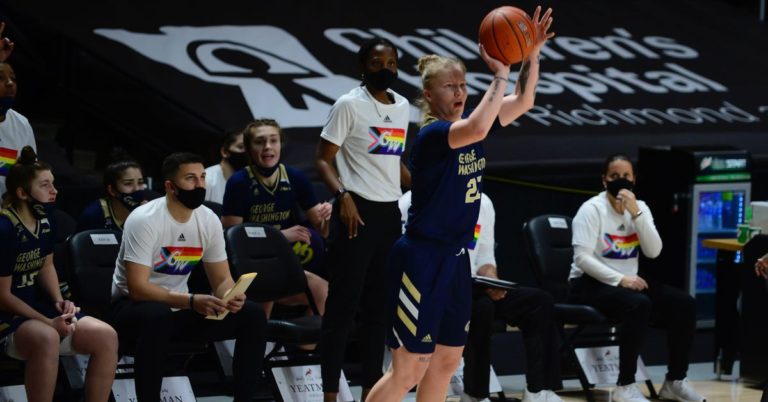

The turning point for Kevin DeMille came during his senior year of college. A team manager for the UConn women’s basketball team, he became close with many of the players, including Stefanie Dolson, who now plays center for the WNBA’s Chicago Sky. At the time, Dolson was figuring out her sexuality, and in turn, demanded authenticity from those around her.
For DeMille, that meant being openly gay around the team. At first, he was hesitant about overshadowing the players, but those anxieties dissipated when they welcomed him with open arms.
Ten years later, DeMille is on staff at George Washington University, serving as one of the team’s assistant coaches. He’s a visible gay face in the world of basketball and uses his platform to push LGBTQ causes. In other words, he’s elevating his voice. He says he wouldn’t be where he is today without the support of strong women.
“Women’s basketball is more communal than the men’s game at the college level, and certainly more accepting and more open, but it’s pioneered by the athletes,” he said. “That was always the hesitation for me. The players are the ones who drive all of this, and asking if there’s space for me in the women’s game. I just was fortunate to be around all of the right people, who made me realize it was OK to be who I was. In fact, to not be who I was would be a detriment to not just my own personal growth, but to my players.”
DeMille’s love for basketball comes from his mother. She was an elite coach at the high school level, and growing up, he played the game constantly. The UConn women’s team attracted him to campus, and within days of DeMille’s freshman year, he wanted to be part of the most successful program in the country.
So one day, he entered the team’s office, and asked how he could get involved. A few hours later, he was working out with Tina Charles. His career in women’s basketball had officially begun.
DeMille stayed on the Huskies staff for seven years, and grew every day.
“Spending seven years at UConn would make anyone want to work in women’s basketball,” he said. “I wanted to watch women’s basketball more than anything, but I feel like it’s just so much easier, these relationships were so much easier, these kids want to be coached so much more. It’s just so natural for me to be in the women’s game.”
Now entering his second decade in the women’s game, DeMille has learned the power of vulnerability. He’s found the only way to truly connect with players is to be your true self.
“The players are the best part of this job,” he said. “They are just young people with a dream. They act fearless, but they’re not. They’re looking for some guidance. So they inspire me in a lot of ways to truly be who I am.
“Me being authentically who I am — sharing about our boyfriend and life together — makes it clear to them that it’s OK to be vulnerable. Their vulnerability is accepted, celebrated and appreciated here. It’s only when we’re vulnerable that we can play better and get closer.”
With that spirit in mind, the George Washington women’s team dedicated their campaign to a “season of action,” hosting collection drives and fundraisers for community organizations throughout the year. On a daily basis, the Covid-19 pandemic threatens to take away the basketball portion of what his players do as college athletes.
But it can’t take away their platform.
“This season, we still don’t what it’s like to be like,” DeMille said. “It could get taken away at anytime. With all of that in my mind, and knowing this is going to be a challenging road to get to February, our GW players and GW staff wanted to make this season about more than basketball.”
One of the team’s initiatives this season was a Celebration of Pride. For a three-game stretch, DeMille and his players and their families donated $5 to the Trevor Project for every assist tallied and $2 to the DC Center for the LGBT Community for every forced turnover.
They raised over $1,000 for the Trevor Project, and $500 for the DC Center.
DeMille says they took their lead from the players and coaches around the WNBA, who used their season to advance social justice causes.
“Once we got back together in August, we’ve been trying to spend a lot more time educating each other about the importance of racial relations and racial equality, but making sure our players know that as college athletes, they have the ability to do so much more than just get good grades and win some basketball games,” he said. “They have a platform.”
In addition to LGBTQ causes, the GW women have supported Black Lives Matter, mental health awareness, and started a group to stop sexual violence at school.
With a campus in the heart of D.C., DeMille says it’s imperative for the program to represent more than basketball. When it comes to being a college athlete, the games are only part of the equation.
“The athletes at the highest level of the women’s game have set the tone,” he said. “They’re saying, ‘This is who we are, this is what our game stands for,’ so it’s important that athletic departments get on board with that. We are in a pretty consequential place, we’re four blocks north of the National Mall, and five blocks west of the White House. The fact that it permeates our athletic department is a no-brainer. Our kids want to make sure they can make a big impact when they leave here.”